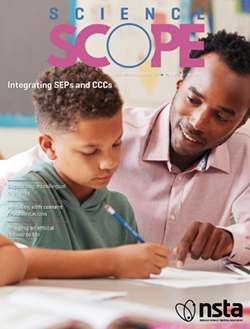Middle School | Formative Assessment Probe
Freezing Ice
By Page Keeley
The purpose of this assessment probe is to elicit students’ ideas about freezing point. The probe is designed to find out if students recognize that the temperature at which water freezes is independent of the volume.
Middle School | Formative Assessment Probe
Boiling Time and Temperature
By Page Keeley
The purpose of this assessment probe is to elicit students’ ideas about the boiling point of a pure substance. The probe is designed to find out whether students recognize that the boiling point of a pure substance stays constant no matter how long it boils.
Middle School | Formative Assessment Probe
Turning the Dial
By Page Keeley
The purpose of this assessment probe is to elicit students’ ideas about a physical property of matter. The probe is designed to reveal whether students recognize that under the same conditions, boiling point remains the same.
Middle School | Formative Assessment Probe
Solids and Holes
By Page Keeley
The purpose of this assessment probe is to elicit students’ ideas about the density of a solid object. The probe is designed to find out whether students recognize that in this phenomenon, air is not displaced, such as when there is a hole in a boat.
Middle School | Formative Assessment Probe
Floating High and Low
By Page Keeley
The purpose of this assessment probe is to elicit students’ ideas about density and buoyancy. The probe is designed to find out how students think an object can be changed to make it float differently.
Middle School | Formative Assessment Probe
Floating Logs
By Page Keeley
The purpose of this assessment probe is to elicit students’ ideas about floating and sinking. The probe is designed to find out if students think changing the size of an object affects how it floats.
Middle School | Formative Assessment Probe
Comparing Cubes
By Page Keeley
The purpose of this assessment probe is to elicit students’ ideas about properties of matter. The probe is designed to find out which properties students think will change if the size of an object made from the same material changes.
Safety Blog
Service Animals in the Science/STEM Laboratory
By Ken Roy
Posted on 2022-12-01

Press Release
NSTA Unveils List of the Best STEM Books for K-12 Students

November/December 2022
Volume 46, Number 2
Three-Dimensional Learning
The Next Generation Science Standards (NGSS) call for three-dimensional learning, or the intentional integration of disciplinary core ideas (DCIs), crosscutting concepts (CCCs), and scientific and engineering practices (SEPs).

November/December 2022
Volume 46, Number 2
Three-Dimensional Learning
The Next Generation Science Standards (NGSS) call for three-dimensional learning, or the intentional integration of disciplinary core ideas (DCIs), crosscutting concepts (CCCs), and scientific and engineering practices (SEPs).



